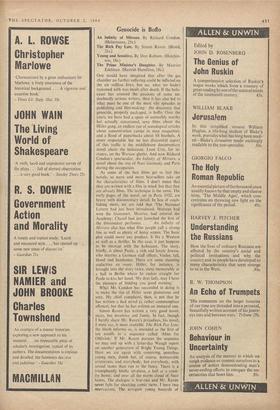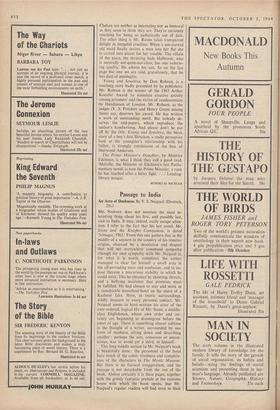Genocide is Boffo
ONE would have imagined that after the gas chamber no further suffering could be inflicted on the six million Jews, but no, what we hadn't reckoned with was insult after death. If the holo- caust has aroused the passions of some un- doubtedly serious writers, then it has also led to what must be one of the most vile episodes in publishing and film-making: the discovery that genocide, properly packaged, is boffo. Over the years, we have had a spate of ostensibly worthy but actually sensational, sexy films about the Hitler gang, an endless run of scatological articles about concentration camps in man magazines, and a flood of paperbacks about SS brothels. A more respectable but no less distasteful aspect of this traffic is the middlebrow documentary novel about the holocaust. Leon Uris, for in- stance, on the Warsaw ghetto. And now Richard Condon's spectacular, An Infinity of Mirrors, a novel about the rise of Nazi Germany and Paris during the occupation.
As some of the best films get to feel like novels, so more and more best-sellers take on the characteristics of films. I don't mean that they are written with a film in mind, but that they are already films. The technique is the same.. The early pages of the novel, set in Paris 1932, are heavy with documentary detail. In lieu of estab- lishing shots, we arc told that 'The National Lottery had just been introduced; Malraux had won the Goncourt, Mauriac had entered the Academy; Chanel had just launched the first of the dressmaker perfumes. . . An Infinity of Minors also has what film people call a strong line as well as plenty of hotsy scenes. The basic . plot could move any product. It fits a Western as well as a thriller. In this case, it just happens to be intercut with the holocaust. The story, briefly, is about Paulc, a rich and lovely Jewess, who marries a German staff officer, Veelee, tall, blond and handsome. There are sonic stunning audacities en route. Hitler, for instance, is brought into the story twice, most memorably at a ball in Berlin where he makes straight for Paule to kiss her hand. 'My dear lady, may I have the pleasure of bidding you good evening:
What Mr. Condon has succeeded in doing is to make the rise of Hitler seem glamorous and sexy. My chief complaint, then, is not that he has written a bad novel (a rather commonplace offence), but that he has written an immoral one.
Simon Raven has written a very good novel, nasty, but inventive and funny. In fact, though I hardly share Mr. Raven's prejudices, his novel„ I must say, is most readable. The Rich Pay Late, the blurb informs us, is intended as the first of ten novels in a sequence called 'Alms for Oblivion.' If M r. Raven pursues the sequence we may end up with a latter-day Waugh report on another generation of Bright Young Things. Here we are again with conniving, penniless young 'men, dumb but, of course, honourable aristocrats, and everybody, but-everybody, with sexual tastes than run to the fancy. There is a triumphantly bitchy set-piece, a ball at a coun- try home; and over all the storm cloud of Suez looms. The dialogue is first-rate and Mr. Raven never fails for shocking comic turns. I have two reservations. The arrogant young bastards of Chelsea are neither as interesting nor as immoral as they seem to think they are. They're curiously touching for being so pathetically out of date. The other thing is Mr. Raven takes transparent delight in vengeful cruelties. When a sex-starved old maid finally invites a man into her flat she is carved into pieces for her trouble. The villain of the piece, the thrusting Jude Holbrook, who is naturally not-quite-our-class, has one redeem- ing quality. He adores his, son. So on the last page but one we are told, gratuitously, that he has died of meningitis.
Young and Sensitive, by Don Robson, is a touching story badly presented by its publishers. Mr. Robson is the winner of the 1963 Arthur Koestler Award 'to stimulate creative activity among prisoners' and the victim of condescension by Hutchinson of London. Mr. Robson, as the judges (V. S. Pritchett and Henry Green among them) say, deserves his award. He has written a work of outstanding merit. But nobody de- serves the end-papers, which reproduce the author's handwriting. And please don't be put off by the title. Young and Sensitive, the bleak story of a boy's first flirtation, a really perceptive look at the youngster's relationship with his father, is strongly reminiscent of the best of Sherwood Anderson.
The Prime Minister's Daughter, by Maurice Edelman, is what I think they call a good read. `Melville, the Minister of Edelman's last Parlia- mentary novel, is now the Prime Minister, a rank he has reached after a bitter fight. . . .' Lending- library nougat.
MORDECAI RICHLER















































 Previous page
Previous page